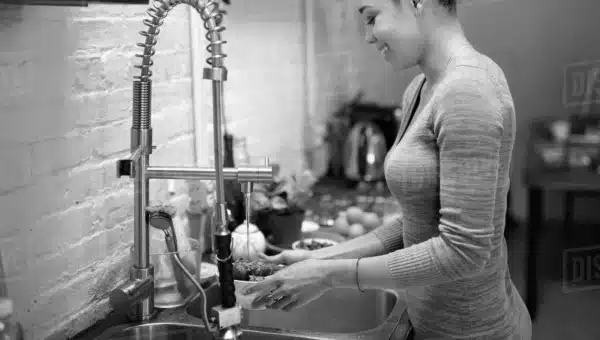Whether you’ve recently moved into a new home or have been living in the same place for years, maintaining good water quality is essential for your health and wellbeing. Poor water quality can not only have a direct impact on your health, but it can also affect your appliances and plumbing systems. Here is a step-by-step guide to help you improve the water quality in your home.
Table of Contents
Understanding the Importance of Water Quality
Recognizing the value of water quality is a critical first step in preserving it. High-quality water is more than just a matter of good taste—it directly influences your health. Water that has been contaminated may harbor bacteria that can cause illnesses, along with potentially hazardous chemicals.
Apart from these health risks, hard water can pose another problem. Hard water is high in mineral content, which can gradually damage your household appliances and plumbing system. This damage can translate into expensive repairs down the line. Hence, understanding the importance of water quality can save you not only from potential health issues but also from unnecessary expenditure on fixing damaged appliances and plumbing.
Recognizing the Signs of Poor Water Quality
It’s crucial to keep an eye out for indicators of subpar water quality in your home, which may not always be as obvious as a strange taste or odor. Some signs are more understated yet equally indicative of an issue. For instance, if your water appears discolored or there is a noticeable buildup of scale around your faucets, this might suggest a problem with your water quality.
Water pressure can also serve as a significant clue. A sudden decrease in water pressure might hint towards sediment build-up in your pipes, potentially indicating poor water quality. Personal symptoms should not be overlooked as well. For example, if you find your skin feeling unusually parched after bathing, this could be due to an excess of minerals in your water.
Another potential sign is a higher-than-normal rate of appliance or plumbing repair. Continual damage to your household devices, despite regular maintenance, could be a result of hard water causing wear and tear. All these indicators can help you identify a possible water quality problem in your home, prompting you to take necessary action.
Getting Your Water Tested
Observing signs of poor water quality warrants a detailed examination. Hence, the subsequent course of action is to conduct a water test. This can be accomplished either through a home testing kit or by hiring a professional water testing service. These tests are capable of detecting a wide array of contaminants in your water supply, such as bacteria, harmful chemicals, and heavy metals. More so, they can also measure the hardness of your water, giving you a clear picture of the mineral content in it. This information is valuable as it helps you ascertain if a water softener installation is required.
Installing a Water Softener
A water softener can be an essential addition to your home if you have hard water. By removing excess minerals, it can enhance the taste of your water, as well as protect your appliances and plumbing systems from premature wear and tear. Water softeners come in a variety of sizes, so you need to select one that matches your home and family’s needs.
The installation process, however, can be a bit intricate, particularly for those not well-versed in plumbing. It typically involves connecting the softener to your water supply line, which may require some modifications to your existing plumbing. If you’re comfortable with DIY projects and have some experience with plumbing, you might be able to handle the installation yourself.
You’ll first need to identify a location for the softener, ideally close to your main water line. Make sure to follow the manufacturer’s instructions for installing the unit, which should cover everything from how to connect the pipes to setting up the control valve.
However, if you’re not confident with taking on the task yourself, it might be more prudent to hire a professional. A licensed plumber will have the expertise to properly install the water softener, ensuring it functions optimally. Moreover, they can also help you choose the right model for your home, which can be beneficial if you’re uncertain about the size or type of water softener you need.
While hiring a professional might come at a higher initial cost, it can potentially save you from costly repairs in the future, should the installation not be done correctly. Regardless of whether you choose to DIY or hire a professional, installing a water softener can be a significant step towards improving the quality of water in your home.
Using a Reverse Osmosis System
Implementing a reverse osmosis system in your home can significantly upgrade the quality of your water. This state-of-the-art system operates by propelling water through a special semi-permeable membrane, thereby removing a wide range of contaminants. The reverse osmosis system is particularly adept at eliminating harmful chemicals and heavy metals from your water supply.
It’s worth noting that while this system may carry a heftier price tag than a water softener, the exceptional water quality it provides makes it a worthwhile investment. Plus, it’s an effective solution if your water test reveals the presence of chemical contaminants or heavy metals.
Installation of a reverse osmosis system involves attaching the system to your home’s plumbing, similar to a water softener. The setup process can be quite complex, and it’s important to follow the manufacturer’s guidelines to ensure correct installation.
For those comfortable with tackling home improvement projects, you might be able to manage the installation on your own. But if you’re not comfortable doing it yourself, or if you have any doubts, consider bringing in a professional. An expert can guarantee that your system is installed properly, ensuring that it works efficiently and provides you with the cleanest water possible.
Keep in mind that a reverse osmosis system will require regular maintenance, similar to a water softener. This includes replacing the system’s filters periodically to ensure its effectiveness.
Implementing a reverse osmosis system in your home is a valuable step toward enhancing your home’s water quality, offering peace of mind that your water is as clean and healthy as possible. Remember, investing in your water quality is an investment in your health and your home’s overall wellbeing.
Regular Maintenance and Checks
Maintaining your home’s water quality is an ongoing process that requires consistent attention. Regular checks and maintenance are critical components of this process. This could involve changing the filters of your water softener or reverse osmosis system, depending on which one you have installed.
Filters play a pivotal role in removing contaminants and keeping your water supply clean. Over time, these filters can become less effective as they fill with the contaminants they’ve collected. Therefore, it’s essential to replace them periodically, following the manufacturer’s instructions to ensure you’re doing it correctly and at the right intervals.
In addition to this, consistently testing your water is an integral part of maintaining water quality. While you might have conducted a thorough test before installing a water softener or reverse osmosis system, remember that this needs to be an ongoing effort. Regular testing allows you to monitor the effectiveness of your water treatment systems and keep a check on any potential new contaminants that might seep into your water supply. Water testing kits are readily available and provide an easy way to keep track of your water quality at home.
Staying on top of these tasks will allow you to identify and address any potential water quality issues before they escalate into serious problems. While this may seem like a lot of work, remember that the goal is to safeguard your family’s health and ensure the longevity of your appliances and plumbing system. So, be vigilant about maintenance and regular checks to enjoy clean, high-quality water in your home.
Seek Professional Help
Don’t feel discouraged if your water quality issues persist despite your best efforts. Sometimes, the situation calls for expert intervention. Enlisting the services of a certified plumber or a water treatment specialist can offer more comprehensive solutions to your water quality concerns. They possess the necessary training and tools to tackle more complex water problems, and can provide tailored advice to effectively deal with your specific situation.
These professionals can conduct an in-depth analysis of your water, beyond standard home testing kits, to identify and eliminate more elusive contaminants. Plus, they can guide you on advanced water treatment systems, or propose modifications to your existing setup for better performance.
It’s worth noting that while professional help may involve an additional expense, it is a valuable investment in the long run. They can help you avoid costly repairs or health issues down the line by addressing water quality issues early on. So, if your efforts aren’t yielding the desired results, don’t hesitate to call in the experts. They can offer the reassurance of knowing that your water quality issues are being handled effectively and efficiently, safeguarding the health of your family and the durability of your household appliances and plumbing system.
FAQs About Water Quality
What is the significance of water quality?
Specific pollutants in water can cause health problems such as gastrointestinal disease, reproductive troubles, and neurological disorders. Vulnerable populations such as infants, young children, pregnant women, the elderly, and individuals with compromised immune systems are more susceptible to sickness.
What is the most efficient water purification technique?
Reverse osmosis filters are highly effective in eliminating hazardous substances from water, including bacteria that cause waterborne illnesses. This method functions by using pressure to push water through a reverse osmosis membrane, which effectively eliminates a large portion of pollutants.
Is whole-house filtration worthwhile?
Raw water may contain debris that might build up in your pipes and harm your appliances. Using a whole house water filtration system with an integrated sediment filter helps protect your pipes and appliances, reducing maintenance costs and extending their longevity.
Conclusion
Enhancing your home’s water quality may be challenging, particularly if you’re a first-time homeowner navigating the intricacies of plumbing systems, but remember – you’re not alone. With the right help and resources, you can ensure access to safe, clean water in your home.

